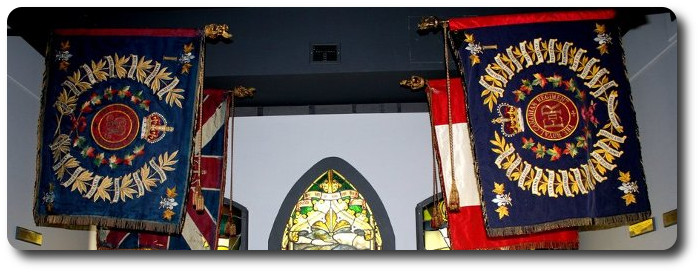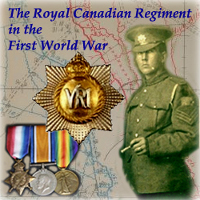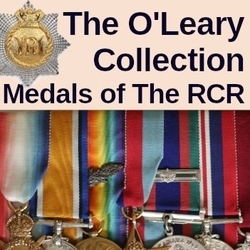
Researching The Royal Canadian Regiment
The Violin
Sgt D.D. Spencer
Reproduced from Pro Patria No. 11, February 1972
Drummer Harry Chandler was a dapper little man born in Paris. France, and he always wore a moustache waxed in the French manner. He went to live in England with his family when he was a teenager. The British Army was his bag. so off he went and enlisted in The Royal Sussex Regiment where he did seven years with the 'Colours' and five years on the reserve.
Later he came to The Regiment in Canada. complete with bags, luggage and a violin with case. He was a very well trained musician, a master I would say, especially in the classics. Bach. Beethoven and Chopin. He played in the lst flute section of the "Drums". doing his guards, blowing the bugle and reading music. To be called a Drummer you had to know all these subjects, including also the snare drum, tenor drum and bass drum with sheet music.
So 1914 found Drummer Harry Chandler serving in the "Drums" with The Regiment at Prospect Barracks, Hamilton. Bermuda. The barracks room in which the Drummers lived was about 200 feet long and 45 feet wide, lit only with paraffin oil (coal oil to us) in three overhead brass lamps on a pulley system. The orderly of the room had to clean and trim the wicks and fill the reservoirs which held three quarts (a daily chore).
One evening as usual Chandler was practising on his violin and other men were playing their harmonicas as the illumination was not so good for reading. in the barracks room.
Meanwhile down at the wet canteen. English beer was being guzzled. The Canteen Corporal called "Time. Gentlemen please". five minutes before First Post and the troops waddled out. Pte Pete Fader loved his suds and he ambled back to the barracks room. singing his favourite song "The Banks of the Wabash".
Our violinist had left his fiddle and bow on his bed while he went to have awash and you guessed it! Pete Fader teetered in. sat down on the fiddle and smashed it in many pieces.
A Drummer's sword is a potent weapon. about 24 inches long with a handle of the Gothic type with cross-bar all greatly embossed in brass with a VRI and crown. When Harry Chandler saw the wreck of his instrument he drew his sword to perform the Coup de Grace on Fader. Fortunately. he was floored by a left hook swung by one of our boxers. We all thought of Kipling's "They're Hanging Danny Devers in the Morning" .It seems strange that when a situation gets out of hand. something comes along to smooth it out.
The monthly guard of one sergeant, one corporal and twenty-eight men proceeded to the German prisoner of war camp which was situated at Ports Island. The inmates were all German naval prisoners. When they took up their duties there our men kept their eyes peeled for a skilled sculptor. The prisoners were forever carving things of great beauty from the local Bermuda cedar wood.
Finally. a skilled wood carver was found and the broken violin given to him. He did a bang-up job on the fiddle which took nearly two months to repair and was very skilfully done. It cost Harry Chandler 500 Players cigarettes.
The tone and resonance of the instrument had not been impaired and we all welcomed the music again. Its owner seemed inspired with his repaired violin and once again it was his prized possession.
We had a visitor in the person of Major E.L. du Domaine. and he, being a skilled violinist, played Rubenstein's Melody in F on Chandler's fiddle. He proclaimed it to be an excellent instrument. Harry told him the fiddle was then over loo years old and it had been handed down from his grandfather.
The said Major du Domaine was leaving Bermuda for England and Chandler left the violin with him for safekeeping. Harry, wherever he is now, will always be remembered by his comrades of Bermuda in 1914 and France in 1915 to 1919.


